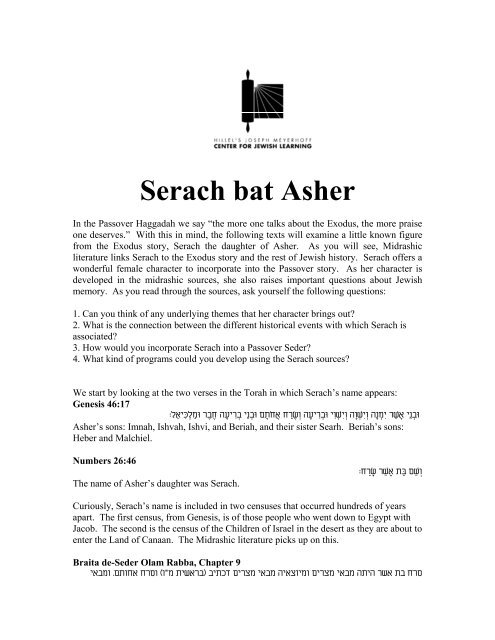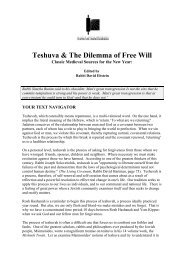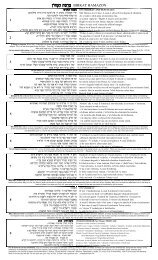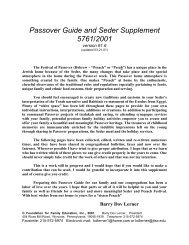Create successful ePaper yourself
Turn your PDF publications into a flip-book with our unique Google optimized e-Paper software.
<strong>Serach</strong> <strong>bat</strong> <strong>Asher</strong><br />
In the Passover Haggadah we say “the more one talks about the Exodus, the more praise<br />
one deserves.” With this in mind, the following texts will examine a little known figure<br />
from the Exodus story, <strong>Serach</strong> the daughter of <strong>Asher</strong>. As you will see, Midrashic<br />
literature links <strong>Serach</strong> to the Exodus story and the rest of Jewish history. <strong>Serach</strong> offers a<br />
wonderful female character to incorporate into the Passover story. As her character is<br />
developed in the midrashic sources, she also raises important questions about Jewish<br />
memory. As you read through the sources, ask yourself the following questions:<br />
1. Can you think of any underlying themes that her character brings out?<br />
2. What is the connection between the different historical events with which <strong>Serach</strong> is<br />
associated?<br />
3. How would you incorporate <strong>Serach</strong> into a Passover Seder?<br />
4. What kind of programs could you develop using the <strong>Serach</strong> sources?<br />
We start by looking at the two verses in the Torah in which <strong>Serach</strong>’s name appears:<br />
Genesis 46:17<br />
:k¥th¦F§k©nU r¤c¤j v¨gh ¦r§c h¥b§cU o¨,«j£t j ©r¤G§u v¨gh ¦r§cU h¦u§J¦h§u vü§J¦h§u v¨b§n¦h r¥J¨t h¥b§cU<br />
<strong>Asher</strong>’s sons: Imnah, Ishvah, Ishvi, and Beriah, and their sister Searh. Beriah’s sons:<br />
Heber and Malchiel.<br />
Numbers 26:46<br />
The name of <strong>Asher</strong>’s daughter was <strong>Serach</strong>.<br />
:j ©r¨G r¥J¨t ,©C o¥J§u<br />
Curiously, <strong>Serach</strong>’s name is included in two censuses that occurred hundreds of years<br />
apart. The first census, from Genesis, is of those people who went down to Egypt with<br />
Jacob. The second is the census of the Children of Israel in the desert as they are about to<br />
enter the Land of Canaan. The Midrashic literature picks up on this.<br />
Braita de-Seder Olam Rabba, Chapter 9<br />
htcnu /o,ujt jrxu (u"n ,hatrc) ch,fs ohrmn htcn vhtmuhnu ohrmn htcn v,hv rat ,c jrx
vhtmuhnu )y ohrmn htcn v,hv scfuhu /jrx rat ,c oau (u"f rcsnc) rntba .rtv<br />
<strong>Serach</strong> the daughter of <strong>Asher</strong> was among those who came to Egypt and among those who<br />
left Egypt. She was among those who came to Egypt, as it says “and <strong>Serach</strong> their sister”<br />
(Genesis 46:17). She was among those who entered the land [of Canaan], as it says, “The<br />
name of <strong>Asher</strong>’s daughter was <strong>Serach</strong>” (Numbers 26:46).<br />
Batei Midrashot, Section 2 -- Midrash “Eshet Chayil”<br />
v,hn ogy vngy tka rat ,c jra uz vnfjc vj,p vhp<br />
Her mouth is full of wisdom (Proverbs 31:26) -- This refers to <strong>Serach</strong> the daughter of<br />
<strong>Asher</strong> who did not taste the taste of death.<br />
1. Why is it important to have someone who came down to Egypt with Jacob still be<br />
around for the Exodus led by Moses?<br />
Why did <strong>Serach</strong> merit to never die? A couple of Midrashim attempt to answer this<br />
question.<br />
Midrash ha-Gadol, Genesis, 46:25<br />
[The brothers said:] If we tell him [Jacob] right away “Joseph is alive!” perhaps he will<br />
have a stroke. What did they do? They said to <strong>Serach</strong> the daughter of <strong>Asher</strong>, “Tell our<br />
father Jacob that Joseph is still alive, and he is in Egypt.” What did she do? She waited<br />
until he was standing in prayer, and then said in a tone of wonder, “Joseph is in Egypt/<br />
There have been born on his knees/ Menashe and Ephraim.” [Yosef be-mitzraim/ Yuldu<br />
lo al birkayim/ Menashe ve-Ephraim.]<br />
Otzar ha-Midrashim (Eisenstein) page 35<br />
xjkn ka urus tku uk rnt ';ugv xjkn ka urusn .uj ,uhrcv kfc ykua ,unv ltkn vn hbpn uk rnt<br />
ohhjc uxbfb ost hbcn ohabt ohrnut ahu 'csbuh ka urus ot hf oc ykua ,unv ltkn iht sckc ;ugv<br />
rzghktu 'rum lkn orhju vgrp ,c vh,cu 'rat ,c jrxu lubj uk rnt ?ov hn uk rnt (t"f) /isg idc<br />
ka ugrzu csbuh grz kfu 'huk ic gauvh hcru '.cghu 'vsuvh hcr ka uscgu 'haufv lkn scgu ovrct scg<br />
cegh vk rnt hj ;xuh ceghk vrnta rucgc rat ,c jrx/// :lk rpxt hbt [k"t ?vnku] k"t /;ugv xjkn<br />
///,un ogy ougyh tk hj tuva ;xuh kg hbraca vpv vz<br />
It was asked, why does the Angel of Death have control over all creatures except for the<br />
generation of Malchas ha-Of? They replied, it is not only the generation of Malchas<br />
ha-Of, over which the Angel of Death has no dominion, but also the generation of<br />
Yonadav, and some say that there are humans who entered alive into the Garden of Eden.<br />
They are: Chanoch, <strong>Serach</strong> the daughter of <strong>Asher</strong>, Eliezer Abraham’s servant, the<br />
servant of the Kushite king, the servant of Rabbi Yehudah, Ya’abetz, Rabbi Joshua ben<br />
Levi, and all of the descendants of Yonadav and of Malchas ha-Of. It was asked why<br />
[did these people merit never dying]?...<strong>Serach</strong> the daughter of <strong>Asher</strong>, because she told<br />
Jacob that Joseph is still alive. Jacob said, this mouth that informed me that Joseph<br />
is still alive will never taste taste of death....
Your Midrash Navigator<br />
1. Do you think that <strong>Serach</strong>’s serving as a news bearer is merit to live forever? Why or<br />
why not?<br />
2. Why did the brothers choose <strong>Serach</strong> to inform Jacob that Joseph is still alive?<br />
3. Why does <strong>Serach</strong> inform Jacob that Joseph is alive in a poem?<br />
4. Note that <strong>Serach</strong> is the only woman listed in the last Mishnah as people over whom the<br />
Angel of Death has no dominion.<br />
5. Can you think of any reasons why the people listed in our Midrash merited to “enter<br />
alive into the Garden of Eden”?<br />
<strong>Serach</strong>’s character is further developed in other Midrashic sources. In the first set of<br />
sources she plays a major role in the Exodus from Egypt.<br />
Yalkut Shimoni, Genesis, 12:64<br />
ohsaf rutn ovrct ubhct ktdb uca l"l /vkutd iuak ikufu ukpfb ,uh,ut anj rnut rzghkt hcr<br />
i"i /stn ubnn ,nmg hf ubngn lk rntba oh,akp shn ejmh ubhct ktdb uc o"o /lmrtn lk lk rntba<br />
sh,g uc .". /h,sep sep ohrmnn ktrah uktdb uc ;"; /tb hbkhmv rntba uag shn cegh ubhct ktdb uc<br />
/ovrctk urxnb ikufu jnmh uh,j,u una jnm aht rntba ,hghcr ,ufkn ;uxc ktrahk kutdk v"cev<br />
ratu /of,t ohvkt seph sep ovk rnta uhjtk ;xuhu ;xuhk ceghu ceghk ejmhu ejmhk irxn ovrct<br />
hbez ufkv ovhbhgk ,u,ut uagu ktrah hbez kt irvtu van utcafu u,c jrxk vkutd sux rxn cegh ic<br />
ukkv ,u,utc iht k"t lfu lf ubhbhgk ,u,ut vagu sjt ost tc vk urnt rat ,c jrx kmt ktrah<br />
inthu shn ;"; tctn h,gna lfa tc ktrah ,t kutdk ahtv tuv k"t h,sep sep rnt tkvu k"t ann<br />
:ogv<br />
Rabbi Eliezer says, five letters were doubled and all of them indicate redemption.<br />
Kaf-kaf with which Abraham our forefather was redeemed from Or Casdim, as it says<br />
leCH leCHa “Go forth from your native land” (Genesis 12:1). Mem-mem with which our<br />
forefather Isaac was redeemed from the Philistines, as it says ki atzamta mi-menu me-od<br />
“And Avimelech said to Isaac, ‘Go away from us, for you have become far too big for<br />
us’” (Genesis 26:16). Nun-nun with which our forefather Jacob was redeemed from<br />
Esau, as it says hatzileni na “Deliver me, I pray, from the hand of my brother from the<br />
hand of Esau” (Genesis 32:18). Peh-peh with which Israel was redeemed from Egypt [as<br />
it says] pakod pakadeti “Go and assemble the leaders of Israel and say to them: the Lord,<br />
the God of your fathers, the God of Abraham, Isaac, and Jacob, has appeared to me and<br />
said, ‘I have taken note of you and of what is being done to you in Egypt’” (Exodus<br />
3:16). Tzadi-tzadi with which God will redeem the Children of Israel at the end of the<br />
current exile, as it says ish tzemach shemo u-mitachtav yitzmach u-vana et heichal<br />
Adonay “and say to him, ‘Thus said the Lord of Hosts: Behold, a man called the Branch<br />
shall branch out from the place where he is, and he shall build the Temple of the Lord’”<br />
(Zechariah 6:12). All of them were given to Abraham. Abraham passed them to Isaac,<br />
and Isaac to Jacob. Jacob passed them to Joseph, and Joseph to his brothers, as it says<br />
pakod yifkad Elohim etchem “The Lord will surely remember you” (Genesis 50:24).<br />
<strong>Asher</strong>, the son of Jacob, passed the secret of redemption to <strong>Serach</strong> his daughter. When<br />
Moses and Aaron came to the elders of Israel and performed signs in front of them, the<br />
elders went to <strong>Serach</strong> the daughter of <strong>Asher</strong> and and said to her. “One man has come and<br />
performed signs in front of us.” She said, “there is no significance in these signs.” They
said to her, “he said ‘pakod pakadeti.’” She said, “the man who will redeem Israel has<br />
come. For I have heard from my father [the secret of] peh-peh. Immediately, “and the<br />
people were convinced” (Exodus 4:31).<br />
1. Why did <strong>Asher</strong> pass the signs to <strong>Serach</strong>, his daughter?<br />
2. Why is <strong>Serach</strong> the only woman entrusted with the signs of redemption?<br />
3. How did the elders know to go to <strong>Serach</strong> to see if Moses was the true redeemer?<br />
Yalkut Shimoni, Deuteronomy 34:965<br />
,t ccxn vhv vzhcc iheuxg ktrah uhva vgac tkt uc exg,b v"ceva van vfz vnc /hdc u,ut rcehu<br />
,c jrx uc vgdp vcrv gdh,ba rjt 'utmn tku ;xuh ka uburt tumnk ,ukhk vakau ohnh vaka rhgv<br />
[rhgv ,t h,ccx ,ukhk vakau ohnh vaka] vk rnt 'lf kf gdh v,t vnk van ubhcr uk vrnt rat<br />
iurt uag vzv ouenc uk vrnt 'xukhb rvbk ufhkuv hng tuc uk vrnt 'utmun hbhtu ;xuh ka uburt aeck<br />
urnt ohnuyrjva 'kjbv lu,c uvufhkavu uvunu,ju ufu,c uvub,bu ohrff ,utn anj ka ,rpug ka<br />
lfa okugk itfn utmh tku ;xuh ,unmg utmnh tka vag lhsh ,j,n uz vnut tm, tka lbumr vgrpk<br />
i, seph sep ktrah ,t ,gcav lthv ,gsh v,t ;xuh ;xuh rntu kjbv kg van sng shn 'ighcav<br />
in vkgu ltruc hbpk ohnjr aec lk ah ohagn 'ktrah ka i,kutd cfg, ktu ktrah hvktk sucf<br />
uhrjt ktrah kfu ukcxu up,f kg ukyb 'sjt vbef ouv,v in vkugu gpgpk uburt khj,v shn 'ouv,v<br />
,jdav tka hbhgc tuv kusd 'sxj ,haga iye rcs lhbhgc ot v"cev uk rnt 'ocvzu opxf ohkcuxn<br />
okugv in ryp,af sxj lng ,uagk hnmgcu hsucfc srt hbt ;tu cvzu ;xfc<br />
He buried him in the valley (Deut. 34:6) Why did Moses merit to have God bury him? At<br />
the time that Israel was occupied with the spoils of Egypt (before they left Egypt they<br />
were told to get gold and silver and other riches from the Egyptians, see Exodus 11:2-3),<br />
Moses walked around the city for three days and three nights looking for Joseph’s coffin,<br />
and didn’t find it. After he troubled himself greatly, he met <strong>Serach</strong> the daughter of<br />
<strong>Asher</strong>. She asked him, “Moses, our teacher, why are so troubled?” He said, “for three<br />
days and three nights I have wandered around the city searching for Joseph’s coffin and I<br />
haven’t found it.” She said, “Come with me” and led him to the Nile River. She said,<br />
“In this place they made a coffin of lead that weights 500 talents, put Joseph inside it and<br />
sent it into the river.” For the magicians had told Pharaoh, “If you do not want this<br />
people to leave from under your rule, make it so they won’t find Joseph’s bones and they<br />
will never leave, because Joseph made them take an oath.” Immediately Moses stood by<br />
the river and said, “Joseph, Joseph: You know how you made Israel take an oath, ‘God<br />
will surely remember you...’ (Genesis 50:24). Give honor to the God of Israel, and do<br />
not delay Israel’s redemption. You have good deeds in your favor, ask for mercy from<br />
your Creator and arise from the depths!” Immediately the coffin began to crumble and<br />
rise out of the depths like a single reed. Moses took it on his shoulders and carried it. All<br />
of Israel was behind him carrying their silver and gold. God said to Moses, “If in your<br />
eyes it is a light matter that you did kindness, it is great in My eyes that you did not<br />
concern yourself with gold and silver. I will descend with My honor and by Myself to do<br />
kindness to you when you depart this world.”<br />
1. Why was <strong>Serach</strong> not with the rest of Israel gathering gold and silver?<br />
2. What would Moses have done if <strong>Serach</strong> did not show him Joseph’s burial place?<br />
Would the Israelites have been redeemed?<br />
3. Is <strong>Serach</strong> properly rewarded for her role in finding Joseph’s coffin? Why or why not?
Tradition connects <strong>Serach</strong> to another incident that happened hundreds of years after the<br />
Exodus from Egypt. During the reign of King David, a man named Sheva ben Bichri led<br />
a rebellion against David. David’s general, Yoav, pursued Sheva to the town of Avel,<br />
where he laid siege to the city. A wise woman from the city approached Yoav and asked<br />
why he would destroy the entire city. Yoav answered that his intention was not to<br />
destroy the city, but only to kill Sheva ben Bichri. The woman delivered Sheva ben<br />
Bichri’s head to Yoav and the city was saved. (See 2 Samuel 20)<br />
The following Midrashim discuss this story:<br />
Midrash Mishley Chapter 31<br />
uzu 'v,nfjc rhgv ,t vkhmva 'ctuh kt vrcsa vatv uz /vbuak kg sxj ,ru,u vnfjc vj,p vhp<br />
rat ,c jrx<br />
Her mouth is full of wisdom (Proverbs 31:26) -- This refers to the woman who spoke to<br />
Yoav and saved the city with her wisdom. And she is <strong>Serach</strong> the daughter of <strong>Asher</strong>.<br />
Midrash Agadat Breishit, Chapter 22<br />
ykpk htsf hbht hbtu vnhka rhg ,ykup vatva asuev jurc hbt vpum g"acr v"cv hbpk ovrct rnt<br />
jrcu hrfc ic gca srna vgac rat ,c jrx uz rhgv ,t vkhmva uz vat vzhtu ukkv ohfrf ,anj<br />
vkctc sus in<br />
Abraham said before the Holy One Blessed be He: “Master of the universe, I see with my<br />
prophetic vision that a woman is going to save an entire city, yet I am not worthy to save<br />
these five towns.” Who is the woman that saved an entire city? <strong>Serach</strong> the daughter of<br />
<strong>Asher</strong>, when Sheva ben Bichri ran away from David to Avel.<br />
1. Is <strong>Serach</strong> greater than Abraham? Why or why not?<br />
Pesikta de-Rav Kahana 11:13<br />
jra ,ehst thhkhebe ihkhtf ibjuh wr ars vnujf wrahk ihhuag ohnv uhv smhf ars ch,h vuv ibjuh wr<br />
tynupnt ihkhtf tkt iuuv tku tbhuv in, ,rntu rat ,c<br />
Rabbi Yochanan was sitting and expounding, how the waters were made into a wall for<br />
Israel. Rabbi Yochanan explained they were like opaque walls. <strong>Serach</strong> the daughter of<br />
<strong>Asher</strong> grew angry and said, “I was there and they were like nets!”<br />
1. Why is <strong>Serach</strong> angry at Rabbi Yochanan? Is her anger justified?







